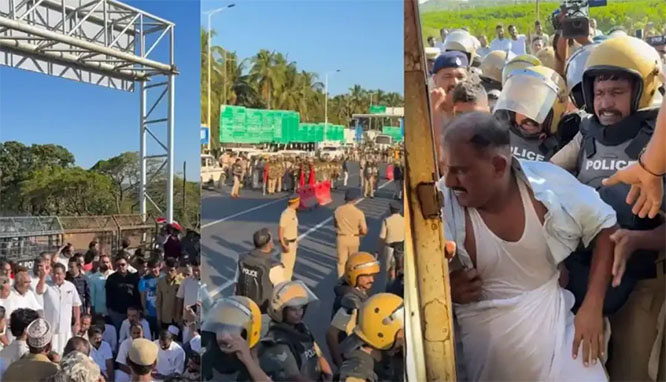
Lucknow, Jan 13: Uttar Pradesh minister Dharam Singh Saini on Thursday resigned from the BJP, becoming the ninth MLA to break off ties with the saffron party just days ahead of the state assembly polls.
Earlier in the day, Dharam Singh Saini returned the security cover and residence allotted to him by the state government, which set off speculation that he was going to quit the BJP.
Dharam Singh Saini is the Minister of State (Independent Charge), Ayush, Food Security and Drug Administration.
The BJP’s Uttar Pradesh unit has witnessed a string of defections over the last few days, starting with cabinet minister Swami Prasad Maurya. At the time, Maurya had said that many more legislators would follow suit.
He said he was resigning due to "gross neglect" towards Dalits, backwards, farmers, unemployed youth and small traders. Over the following days, several other BJP MLAs Brajesh Prajapati, Roshan Lal Varma, Bhagwati Sagar, Mukesh Verma, Vinay Shakya among others, quit the party.
OBC leader Dara Singh Chauhan resigned on Wednesday from the Yogi Adityanath cabinet and appeared to be headed towards the Samajwadi Party. Chauhan said he had worked with dedication for the past five year but Dalits, the OBCs and the unemployed did not get justice from the BJP government.
Dharam Singh Saini is said to be a close aide of Maurya.
Earlier, Suheldev Bharatiya Samaj Party (SBSP) chief Om Prakash Rajbhar claimed that one to two ministers would quit the Yogi Adityanath Cabinet daily and this figure would go up to 18 by January 20. Rajbhar has struck an alliance with the Samajwadi Party for the 2022 assembly elections.
The Uttar Pradesh Assembly elections will be held in seven phases. Polling will be held from February 10 and the counting of votes will take place on March 10.
Earlier, Shikohabad MLA and backward caste leader Dr Mukesh Verma has resigned from the party. "Swami Prasad Maurya is our leader. We will support whatever decision he takes. Many other leaders will join us in the coming days," Verma said.
In his letter addressed to the state BJP president, Varma alleged that the Yogi Adityanath government, in the past five years, has failed to address the problems of weaker sections, youth, farmers, Dalits and OBCs.
He said small traders and businessmen had suffered in the regime.
OBC leader Dara Singh Chauhan resigned Wednesday from the Yogi Adityanath cabinet and appeared to be headed towards the Samajwadi Party.
A day earlier, as BJP leaders brainstormed in Delhi on the UP assembly polls, Swami Prasad Maurya, also a prominent Other Backward Class leader, had quit the state cabinet.
Three other BJP MLAs announced their resignation from the party, seemingly in Maurya's support.
Yet another BJP MLA, Avtar Singh Bhadana, quit the party on Wednesday and is joining the Rashtriya Lok Dal, an SP ally.
But two Uttar Pradesh MLAs – Naresh Saini from the Congress and Hari Om Yadav from the SP – joined the BJP on Wednesday, a welcome development for the ruling party as it deals with the sudden defections from its ranks.
Maurya, Dara Singh Chauhan, (both ministers), Roshan Lal Varma, Brijendra Prajapati, Bhagwati Sharan Sagar, Vinay Shakya and Avatar Singh Bhadana resigned in past two days.






Comments
Add new comment